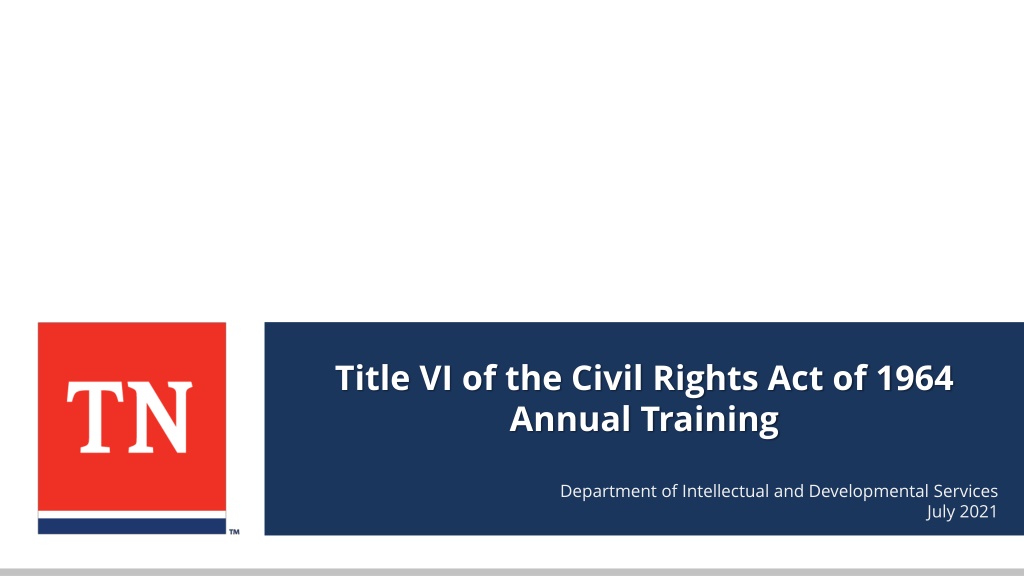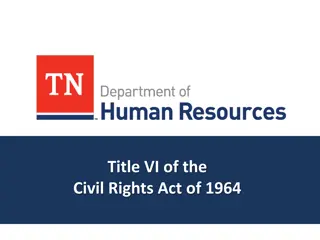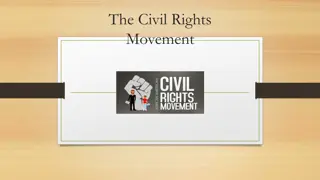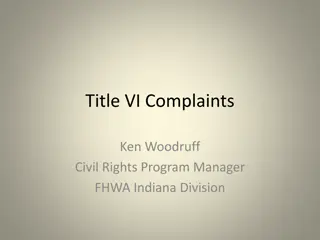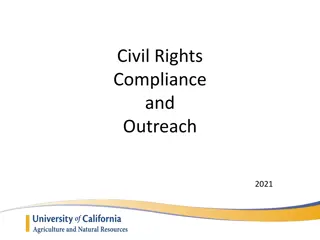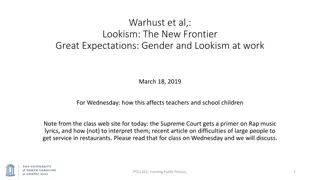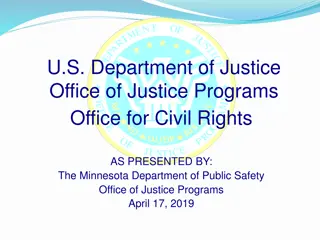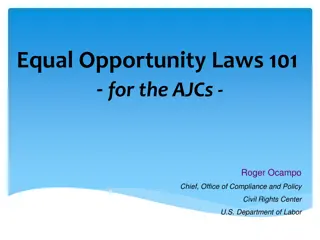Understanding Title VI of the Civil Rights Act of 1964
Title VI of the Civil Rights Act of 1964 prohibits discrimination based on race, color, and national origin in programs receiving federal financial assistance. This training provides an overview of the Act, identification of protected classes, compliance obligations, reporting procedures, and history. Learn about the legislative purpose of Title VI, the impact of discrimination, and the legislative history behind the Act. Discover why Tennessee was groundbreaking in its enforcement of Title VI compliance.
Download Presentation

Please find below an Image/Link to download the presentation.
The content on the website is provided AS IS for your information and personal use only. It may not be sold, licensed, or shared on other websites without obtaining consent from the author. Download presentation by click this link. If you encounter any issues during the download, it is possible that the publisher has removed the file from their server.
E N D
Presentation Transcript
Title VI of the Civil Rights Act of 1964 Annual Training Department of Intellectual and Developmental Services July 2021
Objectives Overview of The Civil Rights Act of 1964 Identification of the Protected Classes under Title VI Obligations and Responsibilities for Compliance with Title VI How to report a Title VI Complaint
Purpose To ensure awareness of the provisions of Title VI of the Civil Rights Act of 1964 and the requirements for compliance with its rules, laws, and regulations.
Simple Justice Title VI, 42 U.S.C. 2000d et seq., was enacted as part of the Civil Rights Act of 1964. It prohibits discrimination on the basis of race, color, and national origin in programs and activities receiving federal financial assistance. As President John F. Kennedy said in 1963: Simple justice requires that public funds, to which all taxpayers of all races contribute, not be spent in any fashion which encourages, entrenches, subsidizes, or results in racial discrimination. Direct discrimination by Federal, State, or local governments is prohibited by the Constitution. But indirect discrimination, through the use of Federal funds is as invidious; and it should not be necessary to resort to the courts to prevent each individual violation.
Discrimination Discrimination is differential treatment that favors one individual, group, or objective over another. It can be intentional or unintentional. Certain groups or classes are protected under the law from discrimination by an institution or entity. It is illegal to discriminate against a protected group by denying provided services or providing a service in a less favorable manner to an individual based on race, color, national origin or for having limited English proficiency (LEP).
Title VI Legislative History and Purpose The Civil Rights Act of 1964 was signed by President Lyndon B. Johnson and became law on July 2, 1964. No person in the United States shall, on the grounds of race, color, or national origin, be excluded from participation in, be denied the benefit of, or be subjected to discrimination under any program or activity receiving Federal financial assistance. - 42 U.S.C.A. 2000d
Tennessee Law On May 31, 1993, the State of Tennessee became the first state to pass legislation enforcing Title VI compliance in all of its departments, programs, and agencies. Accordingly, Tennessee Code Annotated 4-21-904 provides under Tennessee law that: It is a discriminatory practice for any state agency receiving federal funds making it subject to Title VI of the Civil Rights Act of 1964 (42 U.S.C. 2000d et seq.), or for any person receiving such federal funds from a state agency, to exclude a person from participation in, deny benefits to a person, or to subject a person to discrimination under any program or activity receiving such funds, on the basis of race, color, or national origin.
For Title VI to Apply The program or agency must be located within the United States. The program or agency must be providing a service. The program or agency must be receiving direct (recipient) or indirect (sub-recipient) federal funding or assistance.
Programs or Activities Covered by Title VI Discrimination is prohibited throughout an entire agency or institution if any part of that agency or institution receives Federal financial assistance, not just actions involving the federally assisted program. Stated another way- the entire agency is required to comply with Title VI, not just that particular program. State and local agencies or corporations which receive federal financial assistance are subject to the restrictions of Title VI of the Civil Rights Act of 1964 and the Civil Rights Restoration Act of 1987.
Title VI Title VI prohibits discrimination on the basis of "race, color, or national origin under any program or activity receiving Federal financial assistance . Title VI ensures that public funds are not spent in a way which encourages, subsidizes, or results in racial discrimination. Toward that end, Title VI bars intentional discrimination. Title VI protects people of every race, color, or national origin from unlawful discrimination in Tennessee programs and activities that receive Federal financial assistance. It does not cover any additional class or group of persons.
Title VI Prohibited Practices Denial of any service recipient, any services, opportunities, or other benefits for which that individual is otherwise qualified; The provision of any service, or other benefit, which is different or is provided in a different manner to an individual from that which is provided to others in a program; The subjection of any service recipient to segregated or separate treatment in any manner related to the receipt of services; Adopting methods of administration which would limit participation by any group of recipients or subject them to discrimination; and Addressing a service recipient in a manner that denotes inferiority due to the race, color, or national origin of the service recipient.
Title VI Does Encourage the participation of minorities as members of planning or advisory boards. Prohibit discriminatory activities built with federal funds. Requires information and services to be provided in languages other than English. Requires entities to notify eligible populations about applicable programs. Requires assurance of nondiscrimination in the purchasing of good and services.
Americans with Disabilities ACT (ADA) ADA of 1990 Provides comprehensive civil rights protections to a qualified individual with a disability, including in the areas of: Employment State and Local Government Services Public accommodations The ADA applies to state and local governments and business that service the public even if they do not receive federal funds.
Key to Title VI Compliance The Key to Title VI Compliance is to Ensure that individuals receiving services receive: Equal treatment Equal access Equal rights Equal opportunities without regard to the race, color, and national origin, as well as Limited English Proficiency, of the individual.
Title VI Complaints If you see someone being denied access to a program or service because of their race, color, or national origin or being discriminated against in the provision of programs and services because of their race, color, or national origin Contact the Title VI Coordinator or the Title VI Representative for your agency. Contact the Tennessee Human Rights Commission or the U.S. General Services Administration. and/or Contact the US Department of Health and Human Services.
What Do I Do If..? I have a question or a concern about Title VI Contact the Title VI Coordinator for DIDD. If someone tells me they want to file a Title VI complaint Contact the Title VI Coordinator for DIDD or the Title VI Representative for your agency. You may also contact the Tennessee Human Rights Commission or the U.S. General Services Administration.
Limited English Proficiency (LEP) Objectives Overview of Limited English Proficiency (LEP) Overview of the Requirements of LEP
